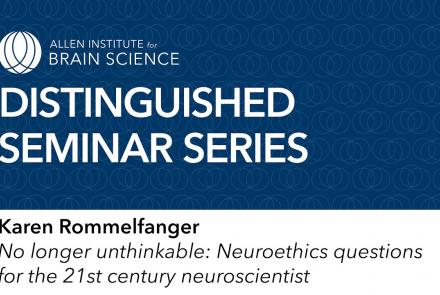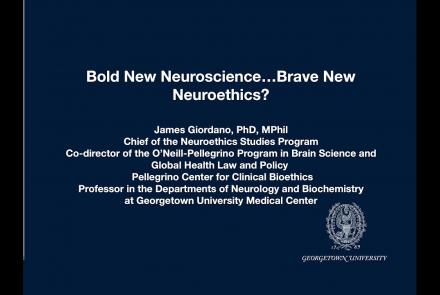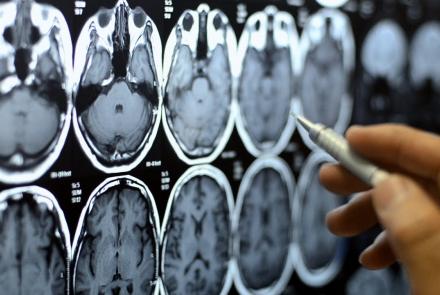Course:
This lecture covers multiple aspects of FAIR neuroscience data: what makes it unique, the challenges to making it FAIR, the importance of overcoming these challenges, and how data governance comes into play.
Difficulty level: Beginner
Duration: 14:56
Speaker: : Damian Eke
This lecture provides guidance on the ethical considerations the clinical neuroimaging community faces when applying the FAIR principles to their research.
Difficulty level: Beginner
Duration: 13:11
Speaker: : Gustav Nilsonne
This lecture covers the ethical implications of the use of pharmaceuticals to enhance brain functions and was part of the Neuro Day Workshop held by the NeuroSchool of Aix Marseille University.
Difficulty level: Beginner
Duration: 1:09:29
Speaker: : Eric Racine
This lecture covers the ethical implications of the use of brain-computer interfaces, brain-machine interfaces, and deep brain stimulation to enhance brain functions and was part of the Neuro Day Workshop held by the NeuroSchool of Aix Marseille University.
Difficulty level: Beginner
Duration: 1:02:00
Speaker: : Jens Clausen
This lecture covers the ethical implications of the use of functional neuroimaging to assess covert awareness in unconscious patients and was part of the Neuro Day Workshop held by the NeuroSchool of Aix Marseille University.
Difficulty level: Beginner
Duration: 1:00:50
Speaker: : Athena Demertzi
This lecture covers how neuroscience could potentially influence the legal/justice system and the ethical implications therein.
Difficulty level: Beginner
Duration: 55:19
Speaker: : Jennifer Chandler
This lecture covers the ethical implications of the neuroscience of moral judgment, and was part of the Neuro Day Workshop held by the NeuroSchool of Aix Marseille University.
Difficulty level: Beginner
Duration: 1:02:19
Speaker: : Bernard Baertschi
Course:
Our ever-expanding global neuroscience landscape requires that we, as a society and as scientists, consider the underlying values and ethics that drive brain research across culture and continents. Across the globe seven large-scale brain research initiatives have emerged and have committed to working together to ensure neuroscience advances together attending to the emerging ethical issues embedded in neuroscience and its implications for society. In this lecture, five neuroethics questions will be presented, to guide neuroscience research in international brain research initiatives.
Difficulty level: Beginner
Duration: 1:02:21
Speaker: : Karen Rommelfanger
Course:
This lecture presents the hope, challenges, risks, and ethico-legal issues associated with advancements in neuroscience technology.
Difficulty level: Beginner
Duration: 27:58
Speaker: : James Giordano
Course:
This lesson provides an overview of the ethical issues that have arisen as a result of the application of advancements in neurotechnology.
Difficulty level: Beginner
Duration: 9:31
Course:
This module covers how neurotechnology is perceived in media today. We discuss a few specific films and talk about how the perception of neurotechnology changes with our media. Finally, we introduce a few interesting terms related to ethics and address some future issues the technology may cause.
Difficulty level: Beginner
Duration: 12:03
Speaker: : Colin Fausnaught
Course:
In response to a growing need in the neuroscience community for concrete guidance concerning ethically sound and pragmatically feasible open data-sharing, the CONP has created an ‘Ethics Toolkit’. These documents (links found below in 'Documents' section) are meant to help researchers identify key elements in the design and conduct of their projects that are often required for the open sharing of neuroscience data, such as model consent language and approaches to de-identification.
This guidance is the product of extended discussions and careful drafting by the CONP Ethics and Governance Committee that considers both Canadian and international ethical frameworks and research practice. The best way to cite these resources is with their associated Zenodo DOI:
Difficulty level: Beginner
Duration:
Speaker: :
Course:
Open Brain Consent is an international initiative aiming to address the challenge of creating participant consent language that will promote the open sharing of data, protect participant privacy, and conform to legal norms and institutional review boards.
Open Brain Consent addresses the aforementioned difficulties in neuroscience research with human participants by collecting:
- widely acceptable consent forms (with various translations) allowing deposition of anonymized data to public data archives
- collection of tools/pipelines to help anonymization of neuroimaging data making it ready for sharing
Difficulty level: Beginner
Duration:
Speaker: :
Topics
- Artificial Intelligence (5)
- Philosophy of Science (5)
- Notebooks (1)
- Connectomics (1)
- protein-protein interactions (1)
- Extracellular signaling (1)
- Animal models (2)
- Assembly 2021 (28)
- Brain-hardware interfaces (13)
- Clinical neuroscience (11)
- International Brain Initiative (2)
- Repositories and science gateways (6)
- Resources (6)
- General neuroscience
(12)
- General neuroinformatics
(5)
- Computational neuroscience (68)
- Statistics (1)
- Computer Science (5)
- Genomics (2)
- (-) Data science (9)
- Open science (12)
- Project management (6)
- Education (1)
- (-) Neuroethics (27)











